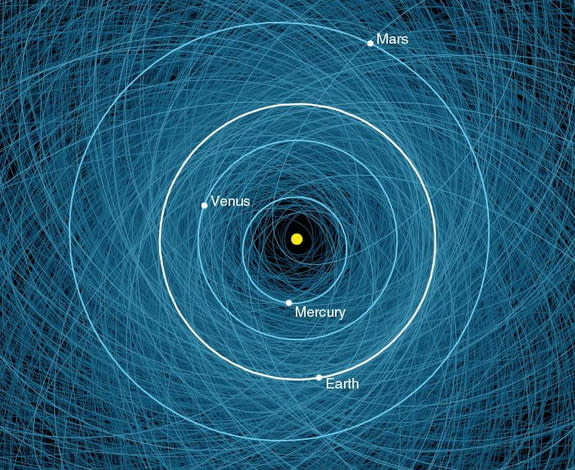| Meteorites, Comets and Asteroids Posted: 10/26/13 Author: Leslie Mullen |
|
| Summary: In a recent event at the American Museum of Natural History in New York City, astronauts and cosmonauts who have flown for three different space agencies (United States, Russia, and Japan) discussed asteroid detection and deflection. | |
|
The panel was held on Friday, December 6, 2013, the same week the United Nations General Assembly adopted measures to protect the planet from asteroid threats. The panelists are members of the Association of Space Explorers (ASE) Committee on Near Earth Objects, which developed recommendations considered by the UN.
The ASE report given to the UN is available online at http://www.space-explorers.org/ATACGR.pdf
Rusty Schweickart, Apollo 9 astronaut, said that asteroid deflection, monitoring, and impact preparation is by necessity an international effort. If an asteroid is on a collision course with Earth, he explained how attempts to deflect it from hitting one nation could result in it hitting others. Only by working together can the different nations prevent asteroid deflection attempts from creating havoc on Earth.
Millions of asteroids orbit the Sun, and there are approximately 10,000 near-Earth objects. Only a few may end up hitting Earth, but when they do the damage can range between a powerful explosion to a mass extinction event, depending on the size and mass of the object. The explosion over Chelyabinsk, Russia last February, for instance, was caused by a meteor about 20 meters across and weighing 11,000 tons, and it injured more than 1,000 people. (The panelists noted that an asteroid is more likely to hit Russia than other nations simply because that country has so much land mass).
|
Former NASA astronaut Ed Lu said the cost of categorizing all the near-Earth objects is the same as building a single highway overpass. Schweickart added that the cost of setting up a program for planetary defense for the first 10 years would cost less than 1 percent of NASA's budget. After the first 10 years, he said, the cost would drop even more.
Documenting all the near-Earth objects is one challenge, deflecting them is another.
Lu said we have many options to deflect an asteroid heading towards Earth because we can track them at least 10 years in advance.
Schweickart said we'd know about an 8-mile-wide asteroid, like the one that killed the dinosaurs, a very long time before it hits. The smaller the asteroid, however, the more difficult it is to detect it -- and smaller asteroids are much more common in the solar system. For instance, Schweickart said the less massive “city killer” asteroids are millions of times more frequent than larger asteroids that could cause mass extinction.
When asked about what to do if we discover an asteroid that will hit us in only a year or less, Schweickart joked you should just make yourself a cocktail and watch the show. On a more serious note, he said that one possibility would be to evacuate the region that was about to be hit.
Most of the panelists are also members of the non-profit B612 Foundation, which is dedicated to protecting humanity from the threat of asteroid impacts. The B612 Foundation is carrying out the first privately-managed interplanetary space mission. Their Sentinel Space Telescope, set to launch in 2018, will find and track a million asteroids which could potentially threaten us.

http://www.astrobio.net/


No comments:
Post a Comment